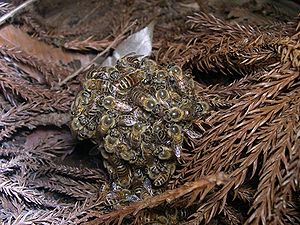Scientists find reactive pollutants in diesel make oilseed rape flowers ‘smell’ different, affecting bees‘ ability to find food
Traffic fumes render the scent of flowers barely recognisable to honeybees and could have a serious impact on their ability to find food, new research has found.
Scientists discovered that reactive pollutants in diesel destroyed key chemicals in the odour of oilseed flowers making them smell different to the bees.
“Honeybees have a sensitive sense of smell and an exceptional ability to learn and memorise new odours,” said Tracey Newman, a neuroscientist at the University of Southampton. “The [effect of diesel fumes on flower scent] could have serious detrimental effects on the number of honeybee colonies and pollination activity.”
Three-quarters of the world’s food crops rely on bees and other natural pollinators, a service valued at £135bn a year globally. “Pollinator services are crucial to humankind,” said Newman.
But there have been serious declines in natural pollinators in recent decades. A combination of factors is blamed, including the huge loss of the flower-rich habitats that sustain bees, as well as disease, and the impact of agricultural insecticides.
The revelation that traffic fumes could be adding to the problems is significant, said Guy Poppy, a professor and ecologist at Southampton, who also worked on the research.
He said: “Diesel exhaust is not the root of the problem, but clearly, with all the other stressors, adding another one is likely to be detrimental to bee health.”
The study, published in the journal Scientific Reports, tested bees’ ability in the laboratory to recognise the aroma of oilseed rape flowers. Bees were strapped down and taught to associate floral scents with food in the form of sugar solutions.
Once the bees learned the connection they began sticking their tongues out in anticipation of food even if it was not offered – an indication that they recognised the smell.
When the scent was presented without pollutants the bees recognised it 98-99% of the time. But after the scent was mixed with levels of diesel exhaust matching those found at roadsides, the bees only recognised it 30% of the time.
“Honeybees are very, very selective on what they home in on – they want the best pollen and nectar yield. They do not go randomly from flower to flower,” said Newman.
The detrimental affect of diesel fumes on the ability of forager bees to sniff out the best flowers would harm hives over time, she said, as the bees working in the hives would not be getting enough food.
The team found it was the highly reactive nitrogen oxides (NOx) that chemically altered the smell by removing key chemicals within a minute of exposure.
“NOx gases represent some of the most reactive gases produced from diesel combustion and other fossil fuels, but the emissions limits for nitrogen dioxide are regularly exceeded, especially in urban areas,” noted Newman. Emissions from petrol vehicles contained even higher levels of NOx, she said.
A field trial has been completed which has tested the effect of traffic fumes on flower scents and directly on bees. The data is now being analysed. Newman said that diesel nanoparticle pollutants, already known to harm human health, may also be affecting bees.
The researchers said the disruption of flower odours by exhaust pollution could be detrimental to many insects. Their paper concludes: “In the case of pollinator species, including the honeybee, these effects would have major economic and ecological impacts, particularly when in conjunction with other stressors detrimental to pollinator health.”
Related articles







